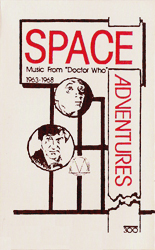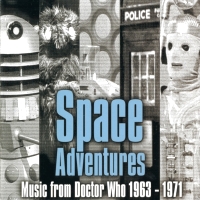
Juan García Esquivel, often known mononymously as Esquivel!, was a Mexican band leader, pianist, and composer for television and films. He is recognized today as one of the foremost exponents of a sophisticated style of largely instrumental music that combines elements of lounge music and jazz with Latin flavors. Esquivel is sometimes called "The King of Space Age Pop" and "The Busby Berkeley of Cocktail Music", and is considered one of the foremost exponents of a style of late 1950s-early 1960s quirky instrumental pop that became known as "Space Age Bachelor Pad Music".
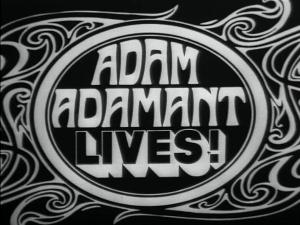
Adam Adamant Lives! is a British adventure television series that ran from 1966 to 1967 on BBC 1, starring Gerald Harper in the title role. The series was created and produced by several alumni from Doctor Who. The titular character was an adventurer born in 1867, who had been revived from hibernation in 1966, thus offering a satirical look at life in the 1960s through the eyes of an Edwardian. In 2020, Big Finish Productions reimagined the series as an audio drama.

Journey Into Space is a BBC Radio science fiction programme written by BBC producer Charles Chilton. It was the last UK radio programme to attract a bigger evening audience than television. Originally, four series were produced, which was translated into 17 languages and broadcast in countries worldwide. Chilton later wrote three best-selling novels and several comic strip stories based upon the radio series.

The Cybermen are a fictional race of cyborgs principally portrayed in the British science fiction television programme Doctor Who. The Cybermen are a species of space-faring cyborgs who often forcefully and painfully convert human beings into more Cybermen in order to populate their ranks while also removing their emotions and personalities. They were conceived by writer Kit Pedler and story editor Gerry Davis, and first appeared in the 1966 Doctor Who serial The Tenth Planet.
The Evil of the Daleks is the mostly-missing ninth and final serial of the fourth season in the British science fiction television series Doctor Who, which originally aired in seven weekly parts from 20 May to 1 July 1967.
The Tomb of the Cybermen is the first serial of the fifth season of the British science fiction television series Doctor Who, which was originally broadcast in four weekly parts on BBC1 from 2 to 23 September 1967.

K9, occasionally written K-9, is the name of several fictional robotic canines in the long-running British science fiction television series Doctor Who, first appearing in 1977. K9 has also been a central character in three of the series' television spin-offs: the one-off K-9 and Company (1981), The Sarah Jane Adventures (2007–2011) and K9 (2009–2010). Although not originally intended to be a recurring character in the series, K9 was kept in the show following his first appearance because he was expected to be popular with younger audiences. There have been at least four separate K9 units in the series, with the first two being companions of the Fourth Doctor. Voice actor John Leeson has provided the character's voice in most of his appearances, except during season 17 of Doctor Who, in which David Brierley temporarily did so. The character was created by Bob Baker and Dave Martin, to whom rights to the character still belong; consequently, Baker's spin-off series K9, which is not BBC-produced, could not directly reference events or characters from Doctor Who, though it attempted to be a part of that continuity.
Cecil Edwin Webber was a British television writer and playwright. He is best remembered as one of the co-creators of the science-fiction series Doctor Who while working as a staff writer for the BBC in the early 1960s.
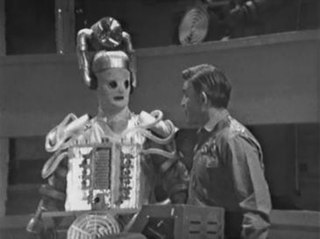
The Tenth Planet is the partly missing second serial of the fourth season in the British science fiction television series Doctor Who, which was first broadcast in four weekly parts from 8 to 29 October 1966. It was William Hartnell's last regular appearance as the First Doctor, and the first story to feature the process later termed "regeneration", whereby the lead character, The Doctor, undergoes a transformation into a new physical form. Patrick Troughton makes his first, uncredited appearance as the Second Doctor.

The Daleks' Master Plan is the mostly missing fourth serial of the third season in the British science fiction television series Doctor Who, which originally aired in twelve weekly parts from 13 November 1965 to 29 January 1966. This twelve-part serial is the longest with a single director and production code (The Trial of a Time Lord was longer but was made in three production blocks, with separate codes, and with four separate story lines each with their own authors and working titles).
Terror of the Zygons is the first serial of the thirteenth season of the British science fiction television series Doctor Who, which was the first broadcast in four weekly parts on BBC1 from 30 August to 20 September 1975. The serial featured the last regular appearance by Ian Marter as companion Harry Sullivan and Nicholas Courtney as Brigadier Lethbridge-Stewart.

The Space Museum is the seventh serial of the second season in the British science fiction television series Doctor Who. Written by Glyn Jones and directed by Mervyn Pinfield, it was broadcast on BBC1 in four weekly parts from 24 April to 15 May 1965. In the serial, the First Doctor and his travelling companions Ian Chesterton, Barbara Wright, and Vicki arrive in a Space Museum on the planet Xeros, where they seek to change their fate after seeing themselves turned into museum exhibits in the future. They also become entangled in a conflict between the militaristic Moroks who run the museum, and the servile indigenous Xerons who work for them.

The Hitchhiker's Guide to the Galaxy is a science fiction comedy radio series primarily written by Douglas Adams. It was originally broadcast in the United Kingdom by BBC Radio 4 in 1978, and afterwards the BBC World Service, National Public Radio in the US and CBC Radio in Canada. The series was the first radio comedy programme to be produced in stereo, and was innovative in its use of music and sound effects, winning a number of awards.
The Doctor Who theme music is a piece of music written by Australian composer Ron Grainer and realised by Delia Derbyshire at the BBC Radiophonic Workshop. Created in 1963, it was one of the first electronic music signature tunes for television. It is used as the theme for the science fiction programme Doctor Who, and has been adapted and covered many times.

The Paradise of Death is a 5-part BBC radio drama, based on the long-running British science fiction television series Doctor Who, and starring Jon Pertwee as the Doctor.
The various film and theatre appearances of the Superman character have been accompanied by musical scores.

Focus is a jazz album recorded in 1961, featuring Stan Getz on tenor saxophone with a string orchestra. The album is a suite which was originally commissioned by Getz from composer and arranger Eddie Sauter. Widely regarded as a high point in both men's careers, Getz later described Focus as his favorite among his own records. The pair would next collaborate on their soundtrack to the 1965 film Mickey One.
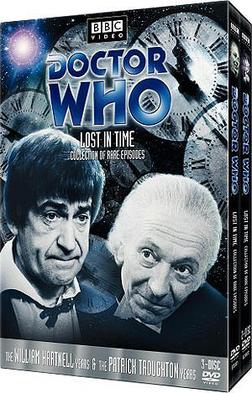
Doctor Who – Lost in Time is a BBC three-disc boxset DVD released in 2004. It is a collection of restored Doctor Who episodes and clips from stories that are incomplete or missing from the Corporation's archives. There were, at the time of release, 108 missing episodes, all from the black-and-white 1960s era. Although the search goes on many or all of these episodes may be lost forever—hence this collection's title.

The Worlds of Doctor Who is a compilation CD consisting of musical excerpts from Doctor Who episode soundtracks, coupled with music from some of the independent spin-off productions for Reeltime Pictures, some original music and several versions of the Doctor Who theme. Most tracks had been previously issued, with three tracks being released for the first time: Mark Ayres' main title music to the documentary Return to Devil's End, and two arrangements of the Doctor Who theme by Mark Lambert and Ian Hu, the second of which includes a guest performance by Sylvester McCoy. The original theme arrangements by Delia Derbyshire and Peter Howell are also included.
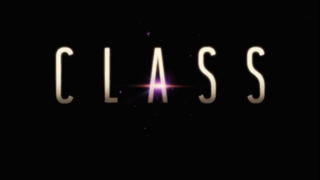
Class is a British science fiction drama programme and a spin-off of the long-running programme Doctor Who. It was created and written by Patrick Ness, who also produced alongside Doctor Who showrunner and lead writer Steven Moffat, and Brian Minchin, who acted as producer on Doctor Who and two of its previous spin-offs, Torchwood and The Sarah Jane Adventures.
